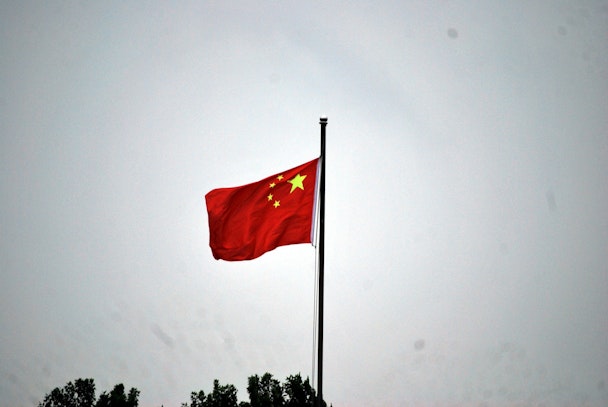How to do business in China: new business success
As the world continues to focus on China it’s no surprise that new business opportunities are abundant in the middle kingdom. As multinationals and international brands rush into the market they are jostling for market share against China’s booming local businesses, which are in turn, increasingly looking outside of China for international growth.

Part three of The Drum's How to do business in China
All this creates a thriving new business market filled with global pitch consultants, local intermediaries and companies that have never worked with an agency running their own pitch process. While no pitch process is the same, there are a number of common factors across the industry when it comes to identifying the tools of new business success.
In the third installation of The Drum’s, How to do business in China series, we asked a selection of China market experts the tricks of the trade when it comes to winning new business.
China is moving at a rapid pace and this expectation of moving fast also applies to the pitch process. While the Chinese may take their time in business negotiations, when it comes to new business and work expectations, timing is everything.
“Generally speaking, the pitch process is much shorter than in other countries, but not because there are any less requirements,” says Krys Piotrowski, managing director of business development at Publicis Media Greater China.
“Common client expectations are that work can be produced and delivered quickly, and therefore a pitch is the opportunity to see how an agency responds under time pressure. Equally, decisions on appointing a winning agency can be taken very quickly, with the expectation that the new agency is able to start working on the business with a very short transition period.”
These accelerated timelines are not the only differences in Chinese new business pitches though with China renowned reputation for negotiating (see How to do business in China: The art of 'Guanxi') put to the test for agencies pricing and remuneration bids.
“The new business processes in China vary a lot – most multi-national companies will follow a process that is similar to other markets, and many will follow a global or regional process that is common to all,” says MediaCom China chief executive Rupert McPetrie.
“Some more local new business pitches have some big differences, for example the pitch timetables are accelerated with very short deadlines, and in some pitches the pricing elements are handled differently from other markets, with each agency’s bids opened live in front of the participating agencies and shared transparently in front of all parties.”
The Chinese emphasis on relationships (also discussed in part two of this series) plays a major role in business deals, and new business pitches are no exception.
McPetrie continues, “Relationship building in China is very different than other markets. Family ties are paramount, but friends, colleagues, and even neighbours can also join the inner circle.”
Piotrowski agrees. “Throughout any pitch process, there are often numerous interactions with clients. This is a testament to the importance that is placed on relationships and trust in business. Often prior business or even personal relationships allow for a fast-track in terms of building this trust and it can feel like a disadvantage going into a pitch where no prior relationships exist. The fact that most pitch processes allow for a continual dialogue or even pre-arranged meetings throughout, allow for some relationship and chemistry building that can prove a key factor in the pitch result.”
With relationships playing a huge role in new business opportunities, agencies with a strong local team and well-established client relationships can prosper over new entrants and teams full of foreigners.
Humphrey Ho, managing director of Hylink, says agencies looking to put their best foot forward need to have, “a large cross-culturally educated and local team of Chinese people”, he says this is preferable to having foreign management.
“RFPs and RFIs are pre-determined, and in a society of "everyone can do everything" it's hard to be purpose-built unless the company comes with an extensive sole focus in a capability or industry.”
Piotrowski agrees, “In our industry around the globe, people buy people, and having the right team in the room will always play a decisive role in selecting the right agency. In China, this is even more pronounced with clients looking for trusted business partners that are agile in understanding and acting on the continually changing landscape in China. This is best summarized by some client feedback following a pitch, where we were informed that although the ideas were strong, they will be redundant within a year because of the ever-changing landscape, so they believed the most important factor was a team that could think fast, smart and thrive on the endless change.”
The sheer rate of change in China, which impacts everything from technology to operations to sales and marketing, is perhaps the biggest difference in doing business in China, says McPetrie.
“The tempo of business generally is much faster, and clients work with agencies on some very short timelines compared to other countries. Briefs have very short turnaround times, go to market operations move very quickly, and rebriefs and inflight adjustments are common. Given the importance and scale of e-commerce in China, there tends to be more attention on the sales impact of marketing and media activities, and a greater demand for a clearer line of sight from investment to business outcome.”
But it’s not just the pitch process which is impacted by the rate of change. This fast-moving market also affects the longevity – or more precisely the brevity - of agency-client relationships.
China has the world’s shortest relationships with agencies, with research from R3 brands revealing the average length of agency appointment is 2.9 years. This short-termism creates a whole new playing field when it comes to pitching.
“Companies generally have less agencies on the roster than they do in other markets,” says Kevin Mann, general manager - marketing & new business, OMD China.
“This makes the market highly competitive in China, as you’ll be pitching more frequently. The pace of change is rapid, so ensuring you stay at the cutting edge of innovation and remain relevant to your clients’ requirements, are paramount to success.”
Agencies which maintain a strong market reputation also benefit when it comes to new business opportunities, according to Rene Chen, partner at JKR Shanghai.
“I always use the metaphor of ‘a one-night stand’ to describe winning new business in China. You have to ensure you are always fit and always look sharp. That means you have to work out, you have to go to different shows to make sure you are ‘seen’ and heard and that you are popular. Then you will be sure will attract interest from others. Why “one-night stand” though? Because there are too many popular guys/gals out there and clients seem to think, ‘why would I need to commit to one relationship?’”
“In a nutshell, to win new business in China, you must get yourself “out there”. You need to be the most popular, most talked about, in-the-know, in-the-scene. That way, new business will come chasing after you. But be mindful that it’s probably only a “one-night stand”. How do you turn that into a long-term commitment? That will be another chapter.”
Chen cautions another difference that foreigners are not always prepared for is the unpredictable volatility of local clients.
“In general, local clients can tend to heat up very fast but then also can cool down very fast. Local clients can be more about emotions rather than being factual.”
“They also have a tendency to be a bit too close and to build person to person relationships versus company to company. This can be a problem because they are following individuals rather than following companies and you can lose the business because of this.”
According to OMD’s Mann, one of the biggest differences when pitching and winning new business in China, is coming to terms with the market differences when it comes to media and technology.
“China is vastly different from other markets in many ways. China is home to the largest consumer base – so you have to factor in a completely different level of scale when addressing the competition for your clients. Additionally, the country’s media landscape is incredibly unique and the digital ecosystem is far more advanced than other markets. Given how advanced the country’s technology sector is, China has leapfrogged the West in areas such as mobile payments, e-Commerce and on-demand TV, green tech and renewable energy, to name a few. so all of this has to be factored in when providing solutions that are relevant to your clients’ requirements.
There are a host of factors to consider when setting out to win new business in China and as JKR Shanghai’s Chen says the most important factor is to embrace the speed, culture and general differences of doing business in China.
“Never think you can change China. China is the sea that salts everything that flows into it. You will be absorbed by it.”
This feature is the third instalment in a series of features exploring how to successfully navigate the China market from a business perspective. Read part one and part two.

